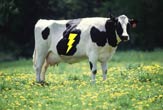Cows with Names Make More Milk

Get the world’s most fascinating discoveries delivered straight to your inbox.
You are now subscribed
Your newsletter sign-up was successful
Want to add more newsletters?

Delivered Daily
Daily Newsletter
Sign up for the latest discoveries, groundbreaking research and fascinating breakthroughs that impact you and the wider world direct to your inbox.

Once a week
Life's Little Mysteries
Feed your curiosity with an exclusive mystery every week, solved with science and delivered direct to your inbox before it's seen anywhere else.

Once a week
How It Works
Sign up to our free science & technology newsletter for your weekly fix of fascinating articles, quick quizzes, amazing images, and more

Delivered daily
Space.com Newsletter
Breaking space news, the latest updates on rocket launches, skywatching events and more!

Once a month
Watch This Space
Sign up to our monthly entertainment newsletter to keep up with all our coverage of the latest sci-fi and space movies, tv shows, games and books.

Once a week
Night Sky This Week
Discover this week's must-see night sky events, moon phases, and stunning astrophotos. Sign up for our skywatching newsletter and explore the universe with us!
Join the club
Get full access to premium articles, exclusive features and a growing list of member rewards.
Researchers in the UK say cows with names make 3.4 percent more milk in a year than cows that just feel, well, like cows.
There seems to be more than just names involved, however.
The study, involving 516 dairy farmers and published online Tuesday by the journal Anthrozoos, found that "on farms where each cow was called by her name the overall milk yield was higher than on farms where the cattle were herded as a group," write researchers Catherine Douglas and Peter Rowlinson of Newcastle University.
Nobody likes to be herded. Even a cow, one might presume. Indeed, the findings in fact point to an overall personal touch that — just a guess here — might say as much about the farmers as it does about the cows.
"Just as people respond better to the personal touch, cows also feel happier and more relaxed if they are given a bit more one-to-one attention," Douglas said. "By placing more importance on the individual, such as calling a cow by her name or interacting with the animal more as it grows up, we can not only improve the animal's welfare and her perception of humans, but also increase milk production."
Happy cows. Okay. Well, if you are a farmer (especially one with a small farm that struggles to be profitable by milking only a handful of cows) you probably would not argue with success. Cows, after all (and in case you thinking of judging them as dumb animals) are known to have a magnetic sixth sense and are not as prone to cow-tipping as you might have heard. Who knows what else they are capable of?
Dairy farmer Dennis Gibb, who co-owns Eachwick Red House Farm outside Newcastle with his brother Richard, says he believes treating every cow as an individual is vitally important. "They aren't just our livelihood — they're part of the family," Gibb said in a statement released by the university. "We love our cows here at Eachwick and every one of them has a name. Collectively we refer to them as 'our ladies' but we know every one of them and each one has her own personality."
Get the world’s most fascinating discoveries delivered straight to your inbox.
See?
The findings:
- 46 percent said the cows on their farm were called by name.
- 66 percent said they "knew all the cows in the herd."
- 48 percent said positive human contact was more likely to produce cows with a good milking temperament.
- Less than 10 percent said that a fear of humans resulted in a poor milking temperament.
"Our data suggests that on the whole UK dairy farmers regard their cows as intelligent beings capable of experiencing a range of emotions," Douglass said. "Placing more importance on knowing the individual animals and calling them by name can — at no extra cost to the farmer –— also significantly increase milk production."
- Amazing Animal Abilities
- My Big Beef with Cloned Cattle
- Love of Milk Dated Back to 6000 B.C.
Robert Roy Britt is the Editorial Director of Imaginova. In this column, The Water Cooler, he takes a daily look at what people are talking about in the world of science and beyond.
Robert is an independent health and science journalist and writer based in Phoenix, Arizona. He is a former editor-in-chief of Live Science with over 20 years of experience as a reporter and editor. He has worked on websites such as Space.com and Tom's Guide, and is a contributor on Medium, covering how we age and how to optimize the mind and body through time. He has a journalism degree from Humboldt State University in California.
 Live Science Plus
Live Science Plus











